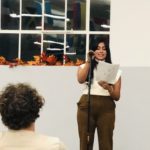By Sarah Anthony, Staff Writer
Asbury University and Asbury Theological Seminary are teaming up again to produce the second year of the Asbury Project.
The Asbury Project is a social entrepreneurship business competition and conference where both University and Seminary students create and submit a business plan listing the target market, the audience, how it will make profits and the social impact of the project. The conference began yesterday (Thursday, November 5) and features speakers Jena Lee Nardella, the co-founder of Blood:Water, a mission that forms wells in Africa, and Dr. Steve Garber, who teaches about vocation and faith at the Washington Institute. Students are encouraged to register to join in hearing the speakers, attending breakout sessions and seeing the presentations of their fellow students.
[column size=two_third position=first ]“The Howard Dayton School of Business and Office of Faith Work and Economics at the Seminary are trying to connect theological ideas and faith to work,” Dr. Kevin Brown, a professor in the School of Business, says on the goals of the Asbury Project. “We all work and find ourselves within some realm of the marketplace so there’s a strong initiative to think about how we’re faithful in that marketplace.”
Brown emphasizes the meaning of social entrepreneurship as Christians, and wants everyone to learn that the change evoked by our business principles can be motivated by our faith. He also says that the idea of the conference is to bring in world-renowned speakers who have used social entrepreneurship in order to enact positive social change consistent with their faith.
Other than attending the conference itself, students were able to submit business plans to the competition.[/column]
[column size=one_third position=last ]
It’s a wonderful opportunity for business and for non-business students
[/column]
“Certain business classes like Small Business Management, Social Entrepreneurship and Innovation and Product Management are required to submit a plan,” said senior Andy Seales, who was the University’s second place winner in last year’s Asbury Project. These classes all focus on certain aspects of business like the startup and the sustainability of small businesses, the kingdom-minded aspects of the business and how to be pioneers in our field of business. While it’s a requirement for many business students, students with various majors have participated.
“It’s a wonderful opportunity for business and for non-business students,” said Seales. “Only a handful of submissions are from the actual business program.”
The plans are judged by the idea and innovation, the presentation, the social impact and its viability and sustainability.
“The top 10 plans are selected and at the very end of the conference, students will present those plans to a panel of judges and there are $10,000 worth of prizes that are given out to five participants,” said Brown. The presentations are in Pecha Kucha format, a Japanese presentation style designed so speakers do not talk for too long.
“It has to be a very tightly packaged, rehearsed presentation. This is what we want students to take away from it,” said Dr. Brown.
Another participant is Colton Cary, a junior in a group of students, who submitted a fitness app that incentivizes people to meet their fitness goals. Cary sees the Asbury Project as good practice for the future but also a way for students to be able to carry out their big ideas and visions.
“It can make a dream a reality,” said Cary.




